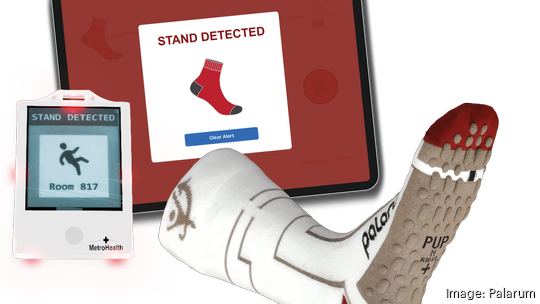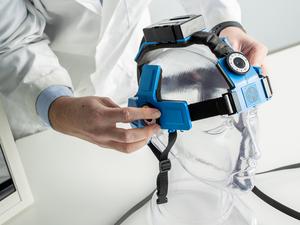
A Cincinnati-area medtech startup is expanding to a larger headquarters, vacating its previous office. The company is gearing up for growth in 2024 as the team explores additional products to enhance the continuum of care and staff safety.
Every year, nearly one million patients in U.S. hospitals fall while hospitalized. Data from the Centers for Medicare & Medicaid Services (CMS) indicate that, on average, U.S. hospitals experience five falls per 1,000 patient days. The average medical cost for each patient fall is $10,220, or $10 billion annually.
Lebanon-based Palarum actively combats the challenge with their PUP (Patient is Up!) Smart Sock. The sock incorporates a patented wearable technology that helps prevent patient falls and enhance rehabilitation therapy. Featuring advanced eTextile and IoT (Internet of things) technologies, PUP socks issue real-time alarms to notify nearby nurses that a fall-risk patient is out of bed and unassisted.

Alongside the alarm, sensors capture data like number of steps, distance, step length, weight distribution and more.
“Staffing is a crisis all across the country right now, especially in hospitals,” said Patrick Baker, Palarum's CEO. “To be able to provide remote monitoring in a way that doesn't require additional staffing, the timing is really perfect to help these nurses keep these patients safe.”
Relocation plans and a recent Cincinnati partner
Palarum is vacating its 3,000-square-foot space at 986 Belvedere Drive in Lebanon to rent 5,000 square feet of space roughly 2 miles away at 103 Oregonia Road. The company will acquire an additional 1,000 square feet to rent each year until it hits 8,000.
Palarum will officially begin operation in the new space Feb. 1, 2024, after $150,000 in renovations. Baker said the company received a $50,000 forgivable loan from the city of Lebanon as an incentive to keep their headquarters in the city.
Palarum recently announced a new partnership with the Cincinnati VA, marking the sixth partnership location the company has with the U.S. Department of Veteran Affairs. Baker anticipates the Cincinnati location will be a jumping off point for future VA partnerships in Ohio, specifically at the Dayton VA.
“The VA has been on the forefront of this,” Baker said. “We are in six different VA hospitals – we're in four different states. They are ... the forerunners in acute care and in long term care. …They have been absolutely instrumental in our progression with where we are.”
Palarum plans additional products, growth in 2024
Since 2014, Palarum has raised more than $20 million from more than 100 angel investors, mainly in Southwest Ohio. Baker, a former UC Health executive, expects to be cash flow positive in 2024 and not seek an additional round of funding until the company aims to go national with its product.
Palarum is set to increase revenue, reported at a little over $2 million in 2023, steadily over the next few years. Baker will also increase his payroll as he adds new employees to his existing workforce of 13 in 2024.

In 2024 and beyond, Palarum seeks to further establish a continuum of care in mobility functioning products, utilizing the wearable textile technology in the smart sock. Eventually, the company hopes to break into remote patient monitoring and telehealth as requested from clients who want to keep track of loved ones from a distance.
“We believe that there's multitude of opportunities to use the technology we've developed in hospitals, but to use it in other industries and other applications that would be beneficial for safety,” Baker said.
In the future, Baker hopes to partner with the state of Ohio and Medicaid to have socks reimbursed in a health care setting. Palarum is specifically eyeing long-term care facilities which witness three times as many falls as hospitals.
“I think there's an innovation gap with some of these long-term care facilities because they just can't afford it,” Baker said. “How do we bridge that gap? What is that solution? Is there a way to incentivize through Medicaid funding to incentivize these nursing homes to adopt technology to keep those patients safe?”








